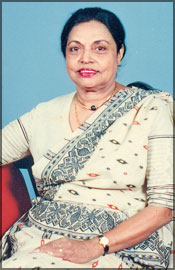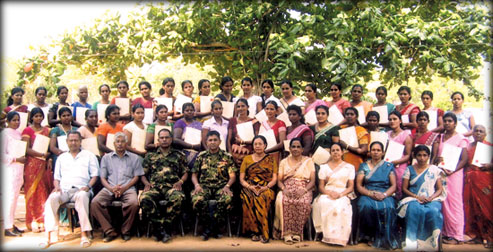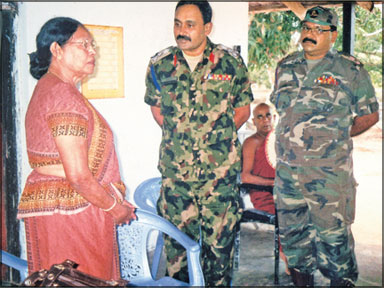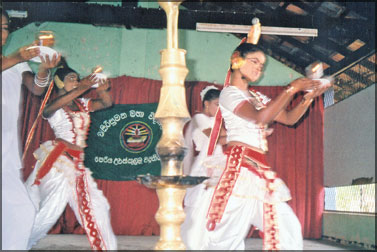Spreading the culture of reconciliation
by Dushyantha MADUGALLE
“Reconciliation is to understand both sides; to go to one side and
describe the suffering being endured by the other side, and then go to
the other side and describe the suffering being endured by the first
side.”- Thich Nhat Hanh
 “If there is to be reconciliation, first there must be truth.”
Timothy B. Tyson, Blood Done Sign My Name: A True Story “If there is to be reconciliation, first there must be truth.”
Timothy B. Tyson, Blood Done Sign My Name: A True Story
The culture of reconciliation is a hard-fought battle like many other
fierce battles which were won by the army heralding in an era of peace
and reconciliation. Forging a culture of reconciliation while the
conflict was in its full-swing, was, perhaps more fictional and a
reality. It was in the height of the conflict in the 1980s that the
ambitious and courageous group of Sinhala women set up an organisation
with the intention of helping out women caught up in the conflict in the
Northern and Eastern provinces.
The ‘Sinhala Women’s Foundation for the Welfare and Development which
earlier known as SKS (Sinhala Kanthabhivurdi Sangvidanaya established in
1985) or Sinhala Women’s Welfare Organisation , is spearheading a
campaign to spread the culture of reconciliation through its activities
aimed at educating youth, imparting life-skills, particularly, for women
and empowering youth and women to build communities and Rehabilitation
and Reconciliation. The organisation carries the goodwill of Sinhala
sisters from the South to the women affected in the conflict in the
North and the East.
In 1985, on the request of ten women (who are all graduates), Indrani
Iriyagolle took the initiative to set up the organisation. Initially
they organised regular trips to the North; Vavuniya, Batticaloa and
Amparai which were the safe towns to travel to, at the time. The primary
objective of the organisation was to look after or provide for the
victims of all ethnicities. At the time, there were separate welfare
camps for Sinhalese, Muslims and Tamils. The group made visits to all
welfare camps and distributed welfare goods, dry rations, milk foods and
clothes. The organisation received more and more requests to help those
affected from diverse areas.
Relief for the volunteer corps
A request was made to provide some solace, counselling and
rehabilitation for the volunteer corps of the army. At the time, there
were around 35,000 volunteer corps and it was mainly made up of rural
youth and they were not equipped to the degree as the regular army.
 Considering the ground situation, the organisation focused on
improving physical and mental status of the soldiers in the Volunteer
Crops of the Sri Lankan Army. The organisation provided the volunteer
corps with medicines such as skin creams, vitamins and clothes that the
soldiers could wear when they were off duty. A vital role that the
organisation played apart from supplying reliefs to the soldiers was to
act as spokeswomen on their behalf making representations to the
Ministry of Defence, the Army and the Volunteer Corps. The organisation
was patronised by the Army, looking after the group and providing them
with food, lodging and security. Considering the ground situation, the organisation focused on
improving physical and mental status of the soldiers in the Volunteer
Crops of the Sri Lankan Army. The organisation provided the volunteer
corps with medicines such as skin creams, vitamins and clothes that the
soldiers could wear when they were off duty. A vital role that the
organisation played apart from supplying reliefs to the soldiers was to
act as spokeswomen on their behalf making representations to the
Ministry of Defence, the Army and the Volunteer Corps. The organisation
was patronised by the Army, looking after the group and providing them
with food, lodging and security.
“Baring the two army commanders, we have worked with all the army
commanders and are very proud to say that Army commanders such as Denzil
Kobbekaduwa appreciated our work and would often join us. Sometimes we
stand together just before the artillery boys get into their lorries and
move out to the battlefront.
At such moments, they would sing patriotic songs and we would also
sing patriotic songs to make them feel that we are with them. Those were
happy moments for all of us. Having recognised our positive role, I have
been invited to address the volunteer corps and the army in Batticaloa,
Ampara and Vavuniya. They expected me to speak about the country,
heroism, leadership, the war and how to face the dangers. ”, Indrani
Iriyagolle recalled the defining moments of the organisation.
The task was two-pronged; the group visited welfare camps as well as
villagers. As the organisation provided relief and goods that villagers
wanted, the group was welcomed by the villagers. Apart from providing
dry rations and medicines, the organisation gave much-needed counselling
for mothers who lost their children and family members and pregnant
women. The group of women professionals such as doctors and counsellors
would visit the villagers in a big van and attend to the needs of the
villagers.
Rehabilitation
When terrorism was eradicated, the focus of the organisation shifted
from providing relief to rebuilding lives with imparting life-skills,
particularly, for women to generate employment and rebuilding
communities. The organisation launched a couple of rehabilitation
projects and one of such project was the training of women in carpentry
and masonry as there were demands to repair and re-build houses.
 The army helped the project by providing lecturers from the
Engineering Unit to teach the women brick-building, mixing, carpentry
and masonry. It was carried out as the on-the-job training program. The army helped the project by providing lecturers from the
Engineering Unit to teach the women brick-building, mixing, carpentry
and masonry. It was carried out as the on-the-job training program.
Seven houses were built in areas such as Kalukundam Maduwa and
Paymaduwa. The women who constructed the houses were so self-reliant
that they only sought help from the men to put the main beam of the
house.
The foundation, then, embarked on income generating projects for
affected persons. With the assistance from the army, training programs
were conducted in school and crown lands were obtained with the sanction
of the Provincial Secretaries for Chana cultivations.
Crops such as peanuts, black gram, green gram and gingerly were
cultivated. In addition, poultry farming and fruit growing were also
introduced to generate income. The foundation provided bicycles for the
women to sell the eggs and farm products to the army kitchens.
As a result of the projects, there affected were able to commence
their lives. The Army and AGA’ offices contributed to the success of the
project.
As the organisation further explored the possibilities of improving
the condition of the army and after President Premadasa recognised its
services, President Premadasa called upon the organisation to directly
link with the Ministry of Defense by setting up the NGO Coordinating
Committee for the North and East.
The NGO Coordinating Committee which met every Friday at the JOC
Quarters (Joint Operation Command) had helped the organisation to carry
out its activities in a much organised manner in addressing the needs of
the soldiers under the patronage of the Army. The NGO Coordinating
Committee was made up of Army Commander, Navy Commander and Air Force
Commander and other civil representatives.
Indrani Iriyagolle recalled the stroke of luck on that fateful day
when the JOC was bombed and none of the members of the organisation had
gone there on different reasons on that that day. The NGO Coordinating
Committee helped to acquire information from the soldiers’ needs and the
soldiers’ needs and requirements were conveyed to the President. Their
immediate needs such as skin oilments and socks were provided both by
the state and the individuals.
The organisation visited each and every army cantonment listing out
the requirements of the soldiers. For instance, the organisation
provided a mobile generator for the army camp in Tammmannakulama. The
list was later discussed at the committee meetings and soldiers’ needs
were duly met. However, the special committee was dissolved. The
organisation prided in drawing up a questionnaire of nearly eight pages
for the first time to find out the needs of the soldiers who were either
in the jungle or in camps. The questions about their needs were divided
into vital areas such as health, religion and counselling, personal
needs and their fears. One of the first priorities of the soldiers was
the need to observe their religions; Buddhist soldiers wanted to listen
to Buddhist sermons while Christian soldiers wanted to get the blessings
of a priest.
Letters of love for soldiers
The foot-soldiers often from rural areas had their education at Maha
Vidyalayas and other schools. Often they suffered from loneliness,
home-sickness and the need for communication was expressed in responding
to questionnaires given to them.
“They would often say that they had beautiful dreams at night and
also related horror stories in the morning. We felt that something to be
done to fill the emotional life of the soldiers.
So, we organised social relation project whereby we invited some of
the girls’ schools in Colombo to write letters, compose poems to
soldiers, comforting them or express different sentiments relating to
war life.
 On our request, principals of several schools in Colombo agreed to
regularly supply us with letters expressing patriotic sentiments,
sisterhood and brotherhood and love, all mixed in one in those letters”,
recalled Indrani Iriyagolle how the organisation helped to give some
sort of emotional comfort for the war-weary soldiers. The organisation
also supplied the army camps with wedding suits tailored in Colombo so
that soldiers who would go home on leave to wed their loved ones could
use these wedding suits. About 8-12 suits were tailored and distributed
two suits per camp. The soldiers also expressed their homesickness and
inability to see their parents. On our request, principals of several schools in Colombo agreed to
regularly supply us with letters expressing patriotic sentiments,
sisterhood and brotherhood and love, all mixed in one in those letters”,
recalled Indrani Iriyagolle how the organisation helped to give some
sort of emotional comfort for the war-weary soldiers. The organisation
also supplied the army camps with wedding suits tailored in Colombo so
that soldiers who would go home on leave to wed their loved ones could
use these wedding suits. About 8-12 suits were tailored and distributed
two suits per camp. The soldiers also expressed their homesickness and
inability to see their parents.
Tsunami and reconciliation
At the beginning the soldiers were given two week of leave, once in a
six months and often they had to spend two or three days on the road
before reaching their homes.
On request, Tata Company of India provided first three large long
green painted buses which were used to provide transport for soldiers.
In addition to providing transports for the soldiers, the organisation
arranged evenings of music with visiting artistes from Colombo.
Especially during the Sinhala and Tamil New Year, the organisation held
New Year celebrations with the soldiers.
On request, the ‘Sinhala Women’s Foundation launched its
rehabilitation activities in Trincomalee and Matara districts in the
aftermath of the tsunami.
As there was a special request that the Trincomalee was neglected,
the foundation launched its program of rehabilitation in Trincomalee
with the assistance of the Army and government officials.
Elders and the youth were badly affected in Trincomalee. Youth were
first given counselling and then training in small enterprise
development to make them economically sustainable.
The members of the organisation, who had overseas training, drew up
modules to teach the youth in a simple manner on how to start an
enterprise and how to do their surveys to find out special needs and
based on the survey, the market for their ventures.
About 300 women in separate batches were given training in enterprise
development within six months.
Most of the women showed an interest in training themselves in
landscaping as a large number of hotels were damaged in the area and
they made a considerable sum of money while others were trained in fish
marketing, dried-fish selling. The Foundation set up a branch in
Trincomalee and women are still profitably engaged in SMEs.
The foundation also carried out its rehabilitation activities in
Matara and Hikkaduwa. A group of unknown women in Hikkaduwa wrote to the
Foundation, informing them that there were 11 women with their children
were to commit suicide by throwing their children into the river.
When the members of the foundation visited Hikkaduwa, they found
about 200 women waiting for them including the 11 women with their
children.
Some of the women were badly led down by the reputed NGO’s by
promising them to pay for their projects and asking them (women) to
obtain money on loan from banks and that the NGOs would pay back the
loans. However, the foundation trained them in SMEs and put them onto
the path of economic prosperity. The Sinhala Women’s Foundation has a
branch in Hikkaduwa and the members are profitably engaged in SMEs.
Rehabilitation and reconciliation
One of the important areas that the foundation engaged in the
development context was the activities of rehabilitation and
reconciliation. The activities commenced in Vavuniya. On request by the
Army, the Foundation commenced its rehabilitation and reconciliation
activities with the focus on women and school youth in the area.
The Foundation trained about 1000 youth (O/L to A/L students, young
boys and girls of Tamils, Sinhalese and Muslims) on what is called Youth
Empowerment Training and setting goals for their future.
The program was assisted by the Army and Education Office. The focus
of the Empowerment Training was to train youth in community leadership
and the message of reconciliation was well-integrated into the
leadership training. The aim was that students should help their
communities and love their communities and then, they will love their
country.
“Feedback from the youth was positive and they informed us that they
helped the elders, cleaned the roads, clean the well and played a big
role in the rehabilitation and rebuilding process. We paid a lot of
attention to communication particularly in the development context as
people are insensitive.
Communication in verbal and body language, facing interviews, how to
write a CV and how to find a job were taught and along with that SME
management training was given to women. Indrani Iriyagolle monitors the
progress of the projects.
A mixed batch of Tamil, Sinhala and Muslim women were given training
in SME management. Apart from the economic progress that the women made,
association was made between Tamil and Sinhala women; once a month
Sinhala women visit Tamil village and Tamil women visit a Sinhala
village.
|



